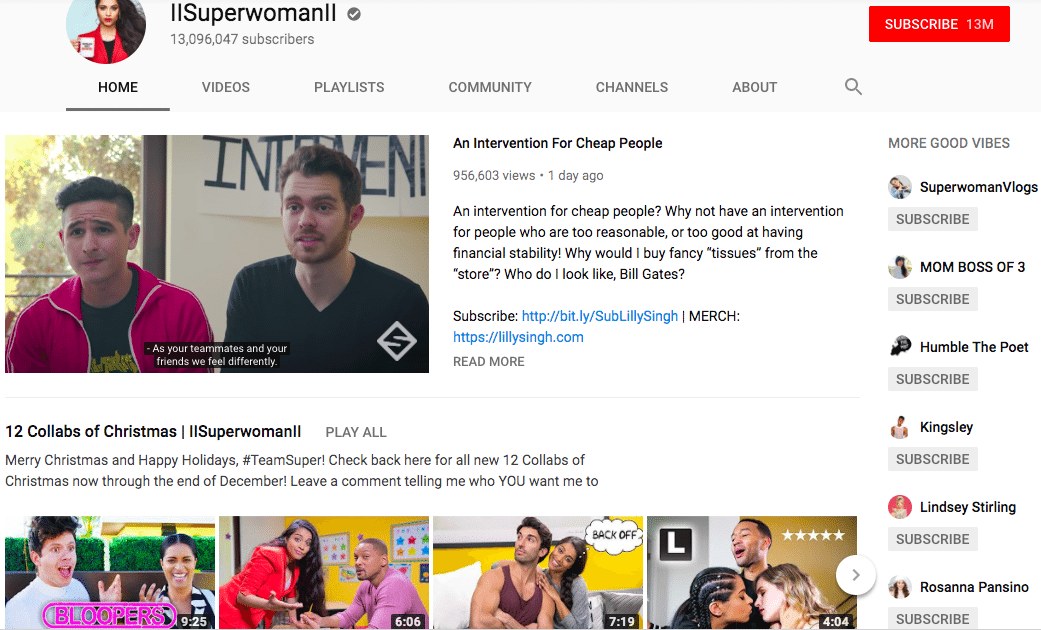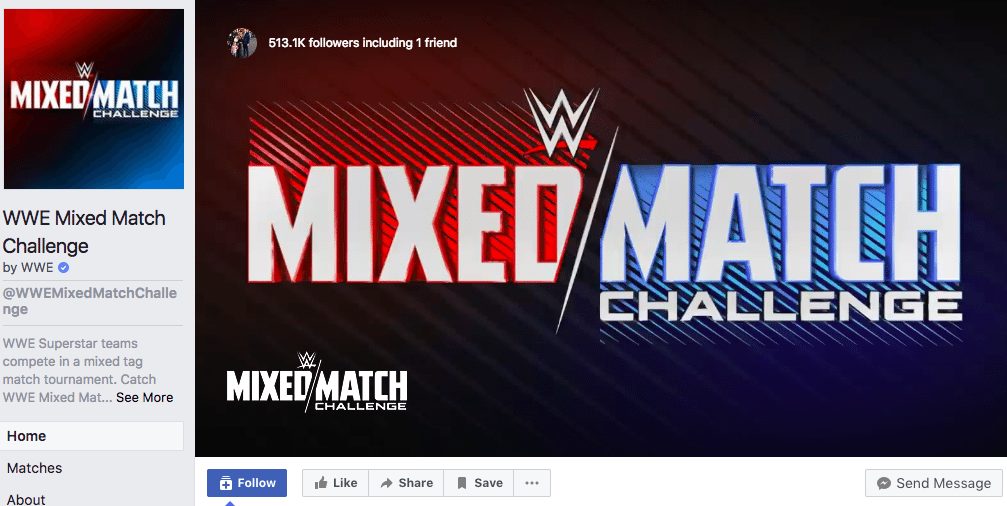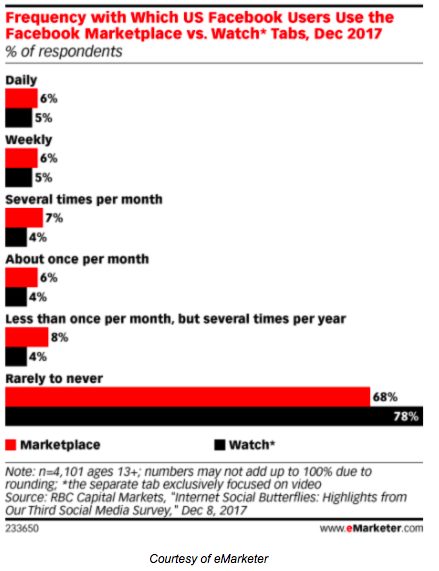Last year, Facebook launched a new, separate area of its platform focused on streaming video content. Almost immediately, a ton of users and media attention excitedly descended on it. The Menlo Park-based company, it seemed, had swiftly taken all of Periscope’s momentum in the streaming space.
The hype was so high that Mark Zuckerberg theorized his new product could even help people “rethink” the video watching experience “through the lens of building community,” all while bringing people together “who care about the same things.”
But just as quick as it went up, the product came crashing down. All of the company’s efforts to promote Watch have thus far yielded rather unimpressive results, according to a recent study by eMarketer. Turns out only 78% of Facebook users “rarely or never” use Facebook Watch. Oof.
So what happened? That’s what I’m going to explore in this article. But first let’s start by figuring out how they decided to get involved in this business in the first place.
The Streaming Play
Amazon Prime, YouTube, Netflix, Hulu, HBO Go, Vimeo, and even Apple are the main tech players pushing a new streaming content ecosystem. Their plan has been simple: to learn about specific audience preferences by gathering data from a variety of targeted content including episodic, long-form, and short-length series. Using their tech to give them an informational edge over traditional content networks meant they could pick up a lot of money left on the table.
The success of these companies so far has shown streaming content is definitely lucrative and leads to huge user growth. In the last ten years, Netflix has gone from 7.5 million users to nearly 94 million. And more than 11 streaming services “reach one million or more homes in a given month,” according to a report on Techcrunch.
Facebook’s play for streaming then, was clear: to continue increasing ad revenue and give itself a foothold in the burgeoning video content market. With Facebook falling behind other video publishers, they coordinated an all-out blitz to catch up.
So they started paying for and creating shows. According to Business Insider “Facebook has been willing to pay millions of dollars for exclusive rights to longer, premium shows… [and] is paying roughly $5,000-$20,000 an episode for short shows.” Facebook also allows producers to distribute cheaper shows on other platforms after an exclusive debut. The premium content, though, is set to remain Facebook exclusive.
But the effort has not been worth it.
It’s Not Working
Even with known publishers such as Buzzfeed, Mashable, and the Travel Channel, in addition to the random celebrity obsessions of Tony Hale and Lavar Ball, most people don’t care about the Facebook channel.
Check out the following table to see how bad it is.
It’s true it’s early days but I think the company should, by now, have had a must-see series that transcends the platform and become part of our larger culture.
Remember House of Cards with Netfilx? Yes, that was a series with major actors, directors and a lot of money, but the effort solidified the plan by the streamer and allowed it to be known for its original content. It created something you needed to see and would be willing to do something you’re never done before (pay for a web network) to check it out.
Shouldn’t Facebook, with its massive user-base and ability to push and pull celebrities, publishers, and advertisers in every way they wish, get people on its platform with the click on a tab? Shouldn’t users at least know about it?
And I know for a fact that people are not watching. No one in my large network knows about it.
I work at Drexel University in Philadelphia, where there are many college-age work study students in our office. Whenever I ask them about Watch, they are often totally unaware of it. I’ve also asked parents, coworkers, and older Facebook users if they’re aware of Watch, and received the same response. Finally, I asked my 13-year-old nephew, thinking perhaps the Watch tab resonated more with a very young audience. And guess what? He doesn’t even have a Facebook account! Hardly anyone I’ve asked about Watch seems to know what it is. After they’re informed, their responses are almost universal: “Why is this happening? We don’t want it.”
It’s Not Where People Want to See Video

To be more specific, people don’t want to use Facebook for watching scripted or quick-upload video content.
I just spent the weekend with my wife’s family. She has two brothers, one 21 and another 19, both deep in the world of YouTube. They discuss vloggers, their lives, their interactions, and the content they create as if they were traditional celebrities. Crazy kids. But exciting brother-in-law that I am, I brought up Watch. They said neither of them used it, that just wasn’t what they wanted to use Facebook for.
This has been a sentiment I’ve heard a number of times, from my office’s work studies to my parents, and it’s one that seems reflected by the low percentage of Facebook users using Watch. Of course, with the latest news involving deprioritizing publisher content in favor of personal content, perhaps Facebook is beginning to realize this, at the very least, in the newsfeed.
According to Digiday, Facebook has begun to rethink their video strategy. They’ve moved from accepting pitches for shorter projects to limiting the number of shows on the platform while also increasing the budgets for those shows. In an effort to make that money back and draw people into Watch, it’s also asking for longer exclusivity and more stringent rights to the content.
An interesting quote from that piece implies this may have been Facebook’s plan all along. According to one original content Watch creator, populating the tab with plenty of lower budget shows “got more producers and publishers thinking about Watch… if they had green-lit only 10 shows from their top publishers, yeah, we could direct a lot of traffic, but it would not be part of the Hollywood conversation it currently is. Because they have hundreds of partners doing it, there are now Hollywood agents telling clients to take their ideas to Facebook.”
This has rung true in a few situations. At CES, actor Kerry Washington announced she would be producing a new series on Facebook Watch. And a new documentary series featuring Tom Brady will also air exclusively there. So there’s some evidence that Watch is being thought of in the business, which could lead to attention from users.
Poor Record and Need to Pivot

And yet, Facebook has a poor track record making successful content decisions, particularly in the area of digital video.
As part of its launch for Facebook Live, for example, it paid content creators to create content for the product. When it turned out that consumers weren’t interested in watching Live content on Facebook, they pivoted and provided funds for simply any Newsfeed video. That doesn’t seem to be working out, either, and Facebook is ending the program and focusing on Watch.
For one, it’s wise to continue pivoting in an effort to find what works. On the other, though, it’s been frustrating for content creators who are told that one kind of product is going to be a focus, staff up and commit to that project, and in less than a year be told that the effort is ending. Consider this quote from a publisher, again courtesy of Digiday:
“Facebook said [the most recent deals] were bridge deals until they figured out a monetization system that worked, but the bridge hasn’t gone anywhere…We’re going to be significantly scaling back the amount of native videos we publish to Facebook and look elsewhere. If they came back to us six months from now and offered to pay for another type of program, I’m not sure we’d go back because none of it has worked.”
Facebook is rapidly burning through goodwill. While it is a behemoth and publishers feel as though they must work with them, at some point being pushed around without seeing results isn’t going to be worth it. Watch doesn’t have an unlimited amount of time to take off, and with more places than ever willing to pay out for content, producers don’t need to commit projects to a place with low visibility.
There are certainly ways that Watch could recover that go beyond the aforementioned Kerry Washington and Tom Brady projects. Potentially booking truly exclusive live sports, events that can only be seen on Watch, comes to mind. Watch is streaming a WWE series beginning next week. Truly premium content, featuring actors or events that some would consider must-watch, is a possibility. Or, they could go all-in on free digital video already popular. Imagine, for example, Facebook Watch signing several huge YouTube stars away from the platform, ensuring a bump in viewership.
There’s a great deal that could be done to improve Watch. For Facebook to successfully dive into this arena, they must commit to deliver profit to their partners. If they don’t, they will slowly leave the platform, leading to fewer engagements on Facebook, less time on site, less advertising revenue, and eventual irrelevancy.
It might seem impossible, but I can assure you, it is not.




